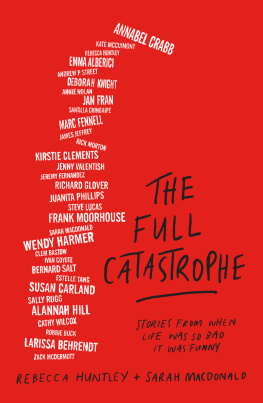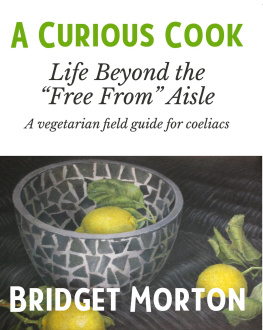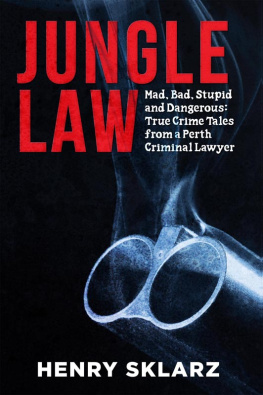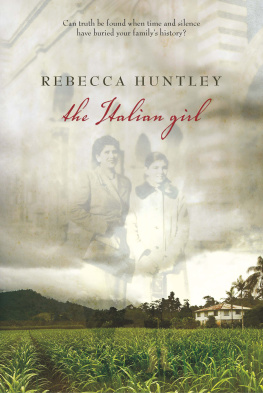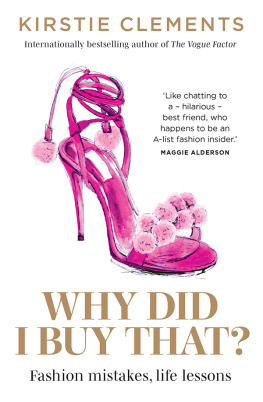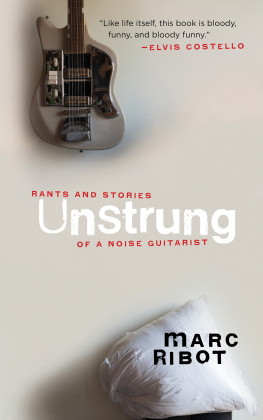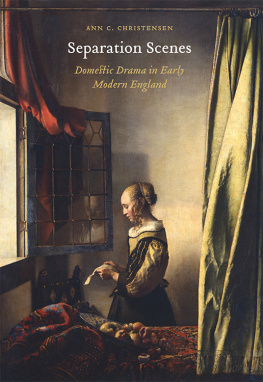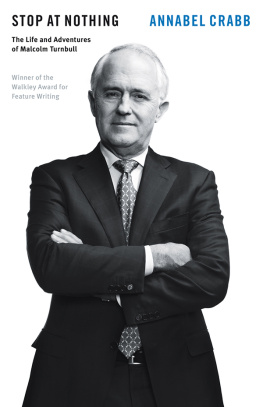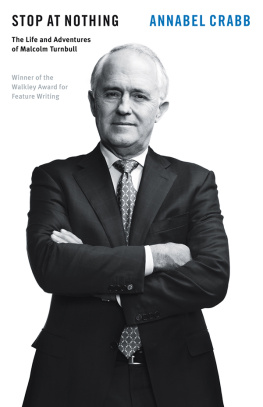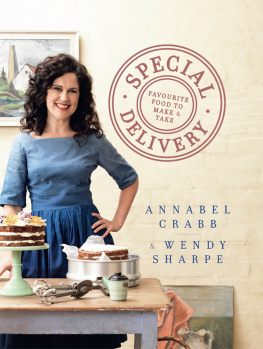Dedicated to catastrophisers everywhere may you rise above it with a smile.
And to our husbands, Jonathan and Daniel, who manage to stay calm in the face of almost anything.
REBECCA HUNTLEY is one of Australias best-known social researchers. She has a PhD in politics, three children, and goes to bed at 8 pm most nights. She is a writer and broadcaster, and the presenter of The History Listen on the ABCs RN every week.
SARAH MACDONALD is an author, facilitator and presenter of Weekend Nightlife on ABC Radio. Her bestselling memoir, Holy Cow, is still travelling the world more than she is. She has two teenagers and a dog and goes to bed at 2 am.
Sarah and Rebecca text a lot in the middle of the day.
WE ALL KNOW one person who somehow flies golden through life. That person who was born beautiful, wealthy, talented and smart, and who does everything well. That individual who lands great jobs, carries them out superbly, and has never ever humiliated themselves at work, in relationships or in public. How we want to hate that person. But, bloody hell, we cant even do that because they are usually so damn untouched by life that they are glowingly charming and always kind to animals.
Infuriating.
Luckily, we dont know anyone like that. And even if that person did exist, this book is not for them. Its for you and your friends and family. Those mortals who have stuff-ups, cock-ups and calamities. The real people.
As we grow older, we realise many things. We realise how dysfunctional our bodies can be and how we should have appreciated them more when we were hotter. We discover that success often goes to the best operator and not the most decent and hard working. We learn that life is often unfair. And we also discover that our lives will be full of minor catastrophes, major stuff-ups and horrific humiliations.
First-world problems mostly. But problems none the less.
Our show, The Full Catastrophe, came about because Sarah has a terrible memory. Shed somehow forgotten terrible moments in her semi-charmed life of being a bestselling writer, radio broadcaster and mother. So when much of her life fell apart a few years ago, she found herself floundering blindly and gasping in shock. Rebecca is good in a crisis (well, at least, in other peoples). She cooked meals for Sarah and delivered them with Italian tablecloths and healthy desserts. She covered for her at work. But most of all, she let Sarah turn that frown upside down. One day, when Sarah was telling Rebecca the latest intimate and disgusting details about death and disaster, Rebecca started to laugh. She laughed because it was all too much. She laughed at the horror. She laughed because it was so ridiculous, there was nothing else to do. Sarah needed that laugh like a beacon in the darkness, and she followed that laugh to the promised land of getting over herself.
And after that coming together in the soup of sorrow, Rebecca and Sarah found they really loved each other and when two people really love each other, they can make a baby. And after a long labour, a lot of screaming and swearing and even more drugs, The Full Catastrophe storytelling event was born.
We originally wanted to call the show Clusterfuck, because there are times in our lives when all the messy bits and pieces, the stresses and competing passions, interests and demands combine to form a shit-storm so epic that it must simply be greeted in the foetal position. But we are nice ladies who swear far too much, so we resisted. At our first Full Catastrophe at Giant Dwarf in Redfern, Sydney, we expected, well, a catastrophe. Wed never hosted an event like this. Wed never tried to be funny in front of an audience. But we had an inkling that a catastrophe shared is a catastrophe diverted, and we hoped there would be great solace in sharing disasters with other people. As we expected, the event was messy and silly. Rebecca was sick and combined heavy duty flu medicine with cheap champagne, which meant she dramatically overshared on one orifice-involved detail in her catastrophic story. But something else happened. We found that The Full Catastrophe was akin to a group hug, a cheap group-therapy session with alcohol, and a joyful up-yours to dark times. We had asked others more successful, famous and admired people to share their disasters and, my god, it felt so good to hear these wonderful people generously share their major stuff-ups. We felt wed finally found a club that would take us.
Every story that has been told at a Full Catastrophe event has made us laugh, gasp and wipe the tears of joy and sadness from our eyes. Yet we always get the biggest thrill from the reaction of the audience. At the end of one event, a woman came up to us, crying with pleasure. We thought she wanted to gloat in gratuitous thrill that these fabulous personalities had exposed their messy bits. But no. She blubbered, Thank you for making me feel my disastrous life is actually okay.
Our pleasure, grasshopper, we said.
The cult was born.
And thats what this is about. We recognise that many of us in these pages are extremely lucky in life, but we learn that none of us is immune from disaster. In fact, we are often a hairs breadth away from it. And while some awful things cannot be laughed at, many can and should be. Sometimes a catastrophe is of our own making. Sometimes we put ourselves in uncomfortable situations. Deborah Knight, Cathy Wilcox and Emma Alberici travelled with children. Clem Bastow went on a quest for love and tempted fate. Sometimes the catastrophe comes to us in the form of the birth of a child (Annabel Crabb), or the death of a loved one (Sarah), or just the act of walking out the front door and into an IKEA store (Rebecca). In this collection, there are family catastrophes, disasters at work (Kate McClymont is the toughest chick we know) and in love, disasters with fruit (or is an avocado a vegetable, Bernard Salt?), and crises that are so insane they defy description. While some of us court catastrophe and some of us like to catastrophise, most often disasters are beyond our control. We are at the mercy of the love we feel for others, which can place us in perilous situations. (What were you thinking, Robbie Buck?)
So come with us, dear connoisseur of human failings, as we traipse through a landscape of humour and fiasco. We hope you read these stories and feel better about yourself, your life and your decisions. And know, in your heart, that this too shall pass.
PEOPLE HAVE BABIES all the time. It is among the least original things a human being can do, apart from dying and wearing ironic T-shirts. Far more hopeless people than Jeremy and I do it all the time; I feel, defensively, that I should point that out before telling this story.
We were in our mid-thirties. We lived in London and held down capable jobs. We had conceived a baby, after that customary awkward interregnum that confronts thirty-something couples when they pull that strategic handbrake turn from years of applying substantial ingenuity to the task of not getting pregnant, and start applying it to achieve the opposite result. Its then they discover that its harder than one always thought.
Wed already encountered a small-scale debacle by the time I was in my ninth month of pregnancy. The public hospital up the road from us was a place called the Whittington. Its emblem was a black cat. Fine; Im not superstitious. The hospital dates back to the 1400s, and survived the Great Fire of London and several name changes over that time, having at different stages been known as the City of London Lying-in Hospital for Married Ladies and St Lukes Hospital for Lunatics. I liked all these aspects of my proposed ante-natal care.

